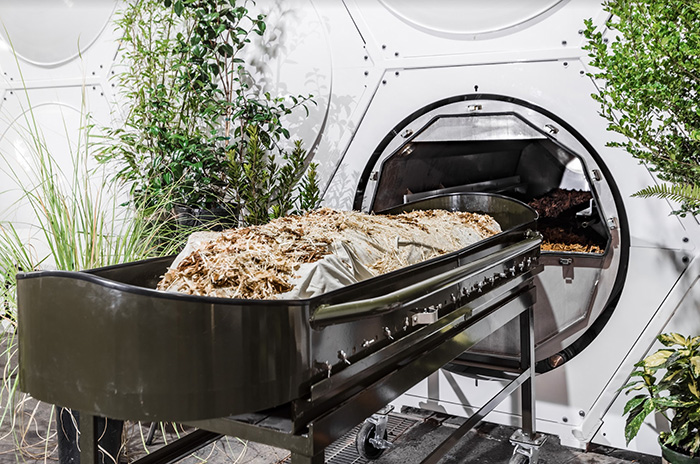
PROSPECT PARK — Natural Organic Reduction (NOR), also called “human composting,” has been touted as an eco-friendly alternative to cemetery burials or cremation by some — but is being panned by Catholic leaders in New York as disrespectful to the dead.
NOR — already legal in a few states — uses natural decomposition with other organic materials to convert the body into dirt. In June, human composting gained approval from the New York Legislature. Gov. Kathy Hochul must now either sign or veto the bill that would allow “green” burials.
But the New York State Catholic Conference is urging Gov. Hochul to veto the bill. According to the group, human composting “fails to sufficiently respect the dignity due the deceased.”
“It’s been around for a number of years, at least the past three years or so,” said Dennis Poust, executive director of the conference. “It hasn’t really gotten much traction.”
That is until June at the wrap of the last session of the Legislature. Poust said the bill passed “overwhelmingly” in both houses but with no media attention seeking Gov. Hochul’s opinion on NOR.
“It was sort of a surprise end-of-session passage when they were doing a whole bunch of bills,” Poust said. “And so she was never questioned by the press about it.”
Didn’t Seem Right
The measure passed 98-52 in the Assembly. Among the “no” votes were four members whose districts overlap the Diocese of Brooklyn, including Brian Barnwell (Maspeth), Erik Martin Dilan (Bushwick), Simcha Eichenstein (Borough Park), and William Colton (Bensonhurst) — all Democrats.
In the Senate, the bill passed 61-2. Voting against were Democrats Simcha Felder (Borough Park) and James Skoufis (Woodbury).
Assemblymember Barnwell is a lifelong Catholic who belongs to Corpus Christi Parish in Woodside, Queens. He recalled on Oct. 13 that the Assembly vote on the legislation was sudden, and there was scant information with which to make his decision, so he went with his gut.
“Just reading the bill, it didn’t seem right,” he said. “Maybe it was because I’m Catholic. I do believe in the body and the soul. It seemed like [voting for human composting] would be problematic.”
Resource Intensive
Still, the legislation has strong support outside of government, as the NOR concept checks a lot of boxes for people concerned about the environment.
Environment Advocates of New York asserted that voters should have a “more natural and climate-friendly after-death option.”
The Advocates stated in a memo that “Cemeteries take up limited land space and are often a source of soil and groundwater pollution resulting from the embalming process which uses toxic chemicals, such as formaldehyde.”
Also, the group claimed that burial caskets are “extremely resource intensive,” consuming 30 million feet of wood, 90,000 tons of steel, and 1.6 million tons of concrete in the U.S. each year.
“Cremation,” they added, “is not much better for the environment, as 28 gallons of fuel are required for a single cremation, releasing 540 pounds of carbon dioxide into the air, along with other dangerous chemicals like monoxide and mercury.”
Do Not Scatter
The Albany-based Catholic Conference works with New York bishops to promote policy and legislation that pursues “social justice, respect for life, and the common good.”
The Catholic Church has not yet issued an official statement on composting human remains. However, its directives on cremation — a practice it once opposed — seem incompatible with NOR.
The Congregation for the Doctrine of the Faith’s 2016 bulletin, “Ad Resurgendum cum Christo (To Rise Again with Christ)” sets specific limits on cremation.
For example, ashes must be kept together and be buried or interred together, not split among loved ones or “scattered.”
Natural & Supernatural
These directives resonate in the Catholic Conference’s memo of opposition to the NOR legislation.
It states, “Sacredness of the human body and its dignity arises out of concern for both the body’s natural and supernatural properties. It is therefore essential that the body of a deceased person be treated with reverence and respect.”
Also, “A process whereby human remains are composted and scattered ‘in a designated scattering garden or area in a cemetery’ (the bill’s language) fails to sufficiently respect the dignity due the deceased.”
The memo concludes, “We believe there are a great many New Yorkers who would be uncomfortable at best with this proposed composting/fertilizing method, which is more appropriate for vegetable trimmings and eggshells than for human bodies.”
But not every Catholic believes rendering a body into dirt offends human dignity.
“I think green burials are a good idea,” said Tom Hinchen, a lifelong Catholic from Windsor Terrace. “If you go back to the time of Jesus, what did they do? They wrapped the body in a shroud and they put it in a cave or tomb that was dug out, and the body decayed.”
Hinchen is a retired Catholic school English and social studies teacher with deep concerns about the environment.
“I certainly don’t equate human remains with vegetable peels and eggshells,” he said. “They talk about reverence for the body, and I’m totally with that. But I don’t think allowing the body to decompose in a natural way is disrespectful at all.
“What do we say on Ash Wednesday? That you are dust.”
Hochul’s Move
The governor’s staff has said she is considering the bill but shared no other information. The Tablet contacted the governor’s press office two weeks ago but received no response as of this writing.
Poust predicted Gov. Hochul would wait until after the Nov. 8 election to handle controversial legislation such as the NOR bill.
“She never made any public statements one way or the other,” he said. “That doesn’t give a great deal of hope, but it’s better than having her come out and say she’s all in favor of it.”
